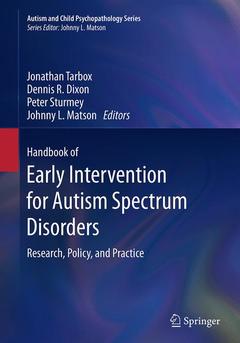Description
Handbook of Early Intervention for Autism Spectrum Disorders, Softcover reprint of the original 1st ed. 2014
Research, Policy, and Practice
Autism and Child Psychopathology Series
Coordinators: Tarbox Jonathan, Dixon Dennis R., Sturmey Peter, Matson Johnny L.
Language: English
Subjects for Handbook of Early Intervention for Autism Spectrum Disorders:
Keywords
ABA; ADHD; ASD; Applied Behavior Analysis; Asperger Syndrome; Assessment; Attention deficit hyperactivity disorder; Autism spectrum disorder; CDC; Centers for Disease Control; Challenging behaviors; Chelation; Childhood psychopathology; Cognitive skills; Curriculum; DSM-V; Denver method; Development; Developmental disorders; Diagnosis
Publication date: 09-2016
Support: Print on demand
Publication date: 04-2014
653 p. · 17.8x25.4 cm · Hardback
Description
/li>Contents
/li>Biography
/li>Comment
/li>
Current rates of autism diagnoses have been cause for concern and research as well as rumor and misinformation. Important questions surround the condition: how early can an accurate diagnosis be made? At what age should intervention start? How can parents recognize warning signs? And what causes autism in the first place?
There are no easy answers, but the Handbook of Early Intervention for Autism Spectrum Disorders gives researchers, practitioners, and academics the science and guidance to better understand and intervene. Background chapters survey the history of professional understanding of the disorders and the ongoing debate over autism as a single entity or a continuum. Chapters on best methods in screening, assessment, and diagnosis reflect the transition between the DSM-V and older diagnostic criteria. And at the heart of the book, the intervention section ranges from evidence-based strategies for developing core skills to ethical concerns, cultural considerations, and controversial treatments.
Included in the Handbook's broad-based coverage:
- Designing curriculum programs for children with autism spectrum disorders (ASD).
- Mainstream education for children with ASD.
- Teaching independent living skills to children with ASD.
- Social skills and play.
- Behavioral and mental health disorders in children with ASD.
- Training and supporting caregivers in evidence-based practices.
- Teaching cognitive skills to children with ASD.
The Handbook of Early Intervention for Autism Spectrum Disorders is a comprehensive reference for researchers, professors, and graduate students as well as clinicians and other scientist-practitioners in clinical child and school psychology, child and adolescent psychiatry, social work, rehabilitation, special education, and pediatric medicine.
Part 1: Diagnosis and Background.- 1. Evolution of Autism: From Kanner to the DSM-V.- 2. Autism Spectrum Disorders: Several Disorders on a Continuum or One?.- 3. Related Disorders.- 4. Assessment of the Core Features of ASD.- 5. Measures Used to Screen and Diagnose ASD in Young Children.- 6. Psychological Theories of Childhood Autism.- 7. Family Adaptation to a Diagnosis of Autism Spectrum Disorder.- Part 2: Intervention.- 8. Ethical Issues in Early Intervention.- 9. Economics of Autism Spectrum Disorders.- 10. Designing Curriculum Programs for Children with Autism.- 11. Reinforcement Arrangements for Learners with Autism Spectrum Disorder.- 12. Discrete Trial Teaching and Discrimination Training.- 13. Natural Environment Training.- 14. Picture Activity Schedules.- 15. Use of Visual Supports with Young Children with Autism Spectrum Disorders.- 16. Teaching Verbal Behavior to Children with Autism Spectrum Disorders.- 17. Social Skills and Play in Children with Autism.- 18. Teaching Cognitive Skills to Children with Autism.- 19. Teaching Independent Living Skills to Children with ASD.- 20. Developmental Approaches.- 21. Recovery and Prevention.- 22. Mainstream Education for Children with Autism Spectrum Disorders.- 23. Controversial Treatments for Autism Spectrum Disorders.- 24. Families of Children with Autism Spectrum Disorders.- 25. Management of General Medical Conditions.- 26. Behavioral Disorders in Young Children with Autism Spectrum Disorder.- 27. Mental Health Disorders in Young Children with Autism Spectrum Disorders.- 28. Training and Supporting Caregivers in Evidence-Based Practices.- 29. Multicultural and Minority Issues.
Jonathan Tarbox, Ph.D., BCBA-D, is currently the Director of Research and Development at the Center for Autism and Related Disorders and the Executive Director of Autism Research Group, a non-profit organization dedicated to conducting research that makes a real difference in the lives of families living with autism. Dr. Tarbox’early career involved positions at both the New England Center for Children and the Kennedy Krieger Institute. Dr. Tarbox is a Board Certified Behavior Analyst-Doctoral, and he received his PhD in Behavior Analysis from the University of Nevada, Reno, under the mentorship of Dr. Linda J. Hayes. Throughout his career in behavior analysis, Dr. Tarbox has been actively engaged in basic, applied, and interdisciplinary research and has over 50 publications in peer-reviewed journals, book chapters in scientific texts, and articles in popular media. Dr. Tarbox currently serves on the board of editors for The Analysis of Verbal Behavior and Behavior Analysis in Practice, is a past member of the board of editors of the Journal of Applied Behavior Analysis and Research in Autism Spectrum Disorders,is a past member of the Governmental Affairs Committee of the Practice Board of the Association for Behavior Analysis International, , and a past President of the Nevada Association for Behavior Analysis. Dr. Tarbox’ research primarily focuses on treatments for establishing complex verbal, cognitive, and social skills.
Dennis R. Dixon, Ph.D., received his doctorate in Clinical Psychology from Louisiana State University with a focus in developmental disabilities. He completed a postdoctoral fellowship at the Johns Hopkins University School of Medicine and specialized in the treatment of severe challenging behaviors. The author of over 20 peer-reviewed articles and multiple book chapters, he currently serves on the editorial board of Research in Developmental Disabilities and Research in Aut
Offers comprehensive, evidence-based research on early intensive behavioral intervention for autism
Explores the evolution of ASD, from Kanner and Asperger through the various DSM editions
Reviews the neurobiology of ASD, including its implications for screening and treatment
Examines the EIBI methods for screening, diagnosing, and treating autism spectrum disorders
Points the way forward for future research and practice
Includes supplementary material: sn.pub/extras



